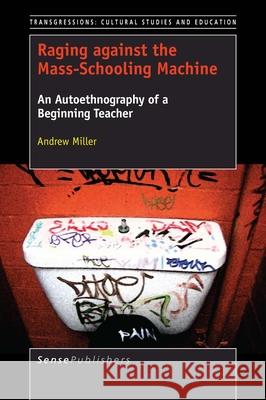Raging against the Mass-Schooling Machine » książka
Raging against the Mass-Schooling Machine
ISBN-13: 9789463008495 / Angielski / Miękka / 2017 / 130 str.
Raging against the Mass-Schooling Machine
ISBN-13: 9789463008495 / Angielski / Miękka / 2017 / 130 str.
(netto: 133,55 VAT: 5%)
Najniższa cena z 30 dni: 132,66
ok. 22 dni roboczych.
Darmowa dostawa!
The biggest danger for beginning teachers is to teach as they were taught. In order to create teaching identities capable of resisting the mind-numbing orthodoxies of the mass-schooling machine, beginning teachers need to interrogate the theories and practices that have shaped them as teachers. Raging against the Mass-Schooling Machine is a compelling autoethnographic account of one beginning teacher's struggle to transform his future teaching identity by unpacking the bruising encounters that shaped him as a student. This is a must-read book for all teachers wishing to 'teach against the grain.' The journey from student to teacher involves almost two decades of junior, primary, secondary, and tertiary education. Few of us critique this journey to see what emotional legacies and taken-for-granted assumptions we carry from one identity to the other. If we remain unconscious of the social and cultural discourses and practices that have shaped and defined us as students and teachers, we may unwittingly reproduce the inequalities, prejudices, and traumas we experienced or observed while growing up, or resort to transmission teaching and authoritarian control because this is the formula of schooling most of us know. Empowering education relies on teachers resisting these toxic scripts and becoming agents of change.
The biggest danger for beginning teachers is to teach as they were taught. In order to create teaching identities capable of resisting the mind-numbing orthodoxies of the mass-schooling machine, beginning teachers need to interrogate the theories and practices that have shaped them as teachers.Raging against the Mass-Schooling Machine is a compelling autoethnographic account of one beginning teacher’s struggle to transform his future teaching identity by unpacking the bruising encounters that shaped him as a student. This is a must-read book for all teachers wishing to ‘teach against the grain.’The journey from student to teacher involves almost two decades of junior, primary, secondary, and tertiary education. Few of us critique this journey to see what emotional legacies and taken-for-granted assumptions we carry from one identity to the other. If we remain unconscious of the social and cultural discourses and practices that have shaped and defined us as students and teachers, we may unwittingly reproduce the inequalities, prejudices, and traumas we experienced or observed while growing up, or resort to transmission teaching and authoritarian control because this is the formula of schooling most of us know.Empowering education relies on teachers resisting these toxic scripts and becoming agents of change.











